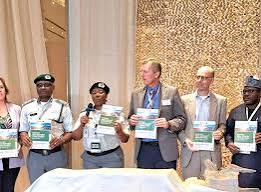LAGOS — The Nigeria Customs Service (NCS) has reaffirmed its commitment to facilitating the importation and trade of renewable energy technologies, in a move aligned with Nigeria’s ambitious Energy Transition Plan and its target to achieve net-zero carbon emissions by 2060.
Speaking at the Trade Facilitation Consultative Forum held in Lagos, themed “Trade Facilitation Measures for Renewable Energy and Energy-Efficient Technologies,” the Comptroller-General of Customs, Bashir Adewale Adeniyi, represented by Deputy Comptroller-General Caroline Niagwan, assured stakeholders of the service’s readiness to remove barriers that hinder the growth of clean energy imports.
“The Nigeria Customs Service plays a pivotal role in supporting national objectives through simplified procedures that encourage the adoption of renewable energy technologies,” Adeniyi said. “We are committed to implementing trade measures that reduce reliance on fossil fuels and promote a greener, more sustainable economy.”
In a bid to support this commitment, the NCS launched the Handbook on Import and Export Procedures for Renewable Energy and Energy-Efficient Technologies, a comprehensive guide that outlines customs processes applicable to clean energy products. The initiative is aimed at ensuring clarity for investors, developers, and importers navigating the renewable energy space.
Adeniyi also disclosed that solar panels and related equipment have been appropriately classified under specific Harmonized System (HS) codes, allowing them to enjoy duty-free and VAT-exempt status. This policy, he explained, is designed to lower costs and incentivize investment in renewable energy.
The Customs Service is working closely with international partners, including the German Development Cooperation (GIZ) and the Nigeria Energy Support Programme (NESP), to streamline customs procedures and promote transparency in trade involving solar panels, batteries, inverters, and other green technologies.
Permanent Secretary of the Federal Ministry of Power, Mahmud Mamman, also addressed participants, noting that trade facilitation plays a critical role in achieving Nigeria’s clean energy goals. “Simplifying customs processes encourages innovation and accelerates access to advanced energy solutions, thereby attracting investment and technical expertise,” he said.
The renewed push by the NCS comes amid growing demand for energy alternatives in Nigeria, especially in rural communities and off-grid areas. With rising fuel costs and erratic power supply, solar and other renewable energy sources have become vital for powering homes, schools, and businesses.
Stakeholders at the forum commended the Customs Service for its proactive approach and urged further collaboration across agencies to improve the ease of doing business in the renewable energy sector.
As Nigeria intensifies its efforts to diversify its energy sources and reduce carbon emissions, the Customs Service’s support is expected to play a crucial role in shaping a sustainable energy future for the country.







